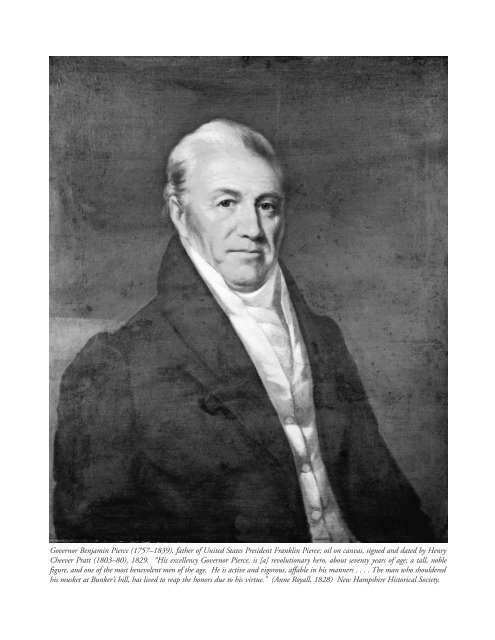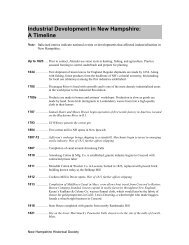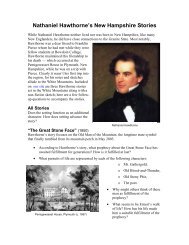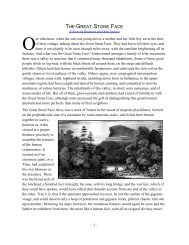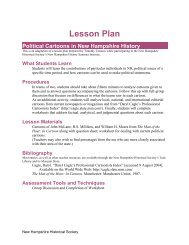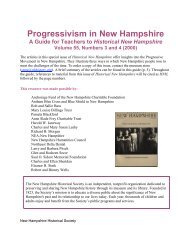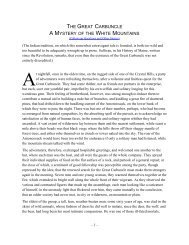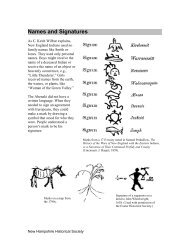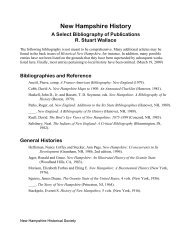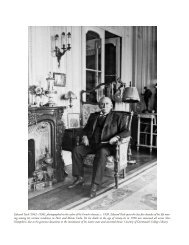Governor Benjamin Pierce - New Hampshire Historical Society
Governor Benjamin Pierce - New Hampshire Historical Society
Governor Benjamin Pierce - New Hampshire Historical Society
You also want an ePaper? Increase the reach of your titles
YUMPU automatically turns print PDFs into web optimized ePapers that Google loves.
<strong>Governor</strong> <strong>Benjamin</strong> <strong>Pierce</strong> (1757–1839), father of United States President Franklin <strong>Pierce</strong>; oil on canvas, signed and dated by Henry<br />
Cheever Pratt (1803–80), 1829. “His excellency <strong>Governor</strong> <strong>Pierce</strong>, is [a] revolutionary hero, about seventy years of age; a tall, noble<br />
figure, and one of the most benevolent men of the age. He is active and vigorous, affable in his manners . . . . The man who shouldered<br />
his musket at Bunker’s hill, has lived to reap the honors due to his virtue.” (Anne Royall, 1828) <strong>New</strong> <strong>Hampshire</strong> <strong>Historical</strong> <strong>Society</strong>.
7<br />
Inheriting the Revolution: <strong>Benjamin</strong> <strong>Pierce</strong>’s World, Ideals, and Legacy<br />
Wesley G. Balla<br />
Contemporary Americans often view their<br />
history as fixed and immutable, an endless<br />
parade of people and events marching<br />
forward across time and space. Nineteenth-century<br />
letters, diaries, account books, and newspapers<br />
surviving in <strong>New</strong> <strong>Hampshire</strong> indicate that, in reality,<br />
lives then as now were in constant flux, built on a<br />
myriad of relationships and influences. Ties of family<br />
and business, religious beliefs and politics, together<br />
with memories of events and people, great and ordinary,<br />
have helped shape identities and fortunes. Chief<br />
among the influences on Franklin <strong>Pierce</strong>’s personality<br />
and values were those of his father <strong>Benjamin</strong>, one<br />
of the leaders of the revolutionary generation in<br />
<strong>New</strong> <strong>Hampshire</strong>.<br />
“The Glorious Principles of Independence”<br />
On a cold Christmas Day in 1824, General<br />
<strong>Benjamin</strong> <strong>Pierce</strong> hosted twenty-one veterans of the<br />
Revolutionary War at a dinner in his commodious<br />
tavern situated on the turnpike in the Lower Village<br />
of Hillsborough, <strong>New</strong> <strong>Hampshire</strong>. Inspired by the<br />
Marquis de Lafayette’s visits to the United States in<br />
1824 and 1825 in celebration of the fiftieth<br />
anniversary of the nation’s founding, General <strong>Pierce</strong><br />
invited his surviving comrades in the town of<br />
Hillsborough to join him in honoring the heroes,<br />
events, and ideals of the American Revolution.<br />
Although a few Hillsborough veterans were in their<br />
eighties, most were in their sixties and seventies when<br />
they gathered at the <strong>Pierce</strong> home that day. At 11:00<br />
WESLEY G. BALLA is director of collections and<br />
exhibitions at the <strong>New</strong> <strong>Hampshire</strong> <strong>Historical</strong> <strong>Society</strong> and<br />
curator of “Franklin <strong>Pierce</strong>: Defining Democracy in<br />
America,” on view at the <strong>Society</strong>’s Tuck Library from<br />
July 2004 to May 2005.<br />
in the morning, after the group had assembled,<br />
General <strong>Pierce</strong> made a short, emotional address<br />
welcoming his guests and encouraging them to<br />
recount the feats and perils they had faced in fighting<br />
the British. Eighty-nine-year-old Ammi Andrews<br />
and eighty-three-year-old John McColley—the two<br />
oldest veterans present—were unanimously elected<br />
president and vice president of the day as a mark of<br />
respect and veneration. The meeting was called to<br />
order and, after Congregational minister Rev. John<br />
Lawton offered a prayer of blessing, the assembled<br />
veterans related a variety of anecdotes about their<br />
revolutionary service. 1<br />
At 1:30, the group moved to the dining room<br />
where they consumed a hearty dinner punctuated by<br />
a succession of thirteen toasts, one for each of the<br />
original states of the Union. The first nine toasts<br />
honored the memory of George Washington and the<br />
heroes, as well as the many hard-won battles, of the<br />
Revolution. In contrast, the final four toasts looked<br />
to the future rather than the past, calling for the<br />
country’s leaders to be patriotic and honest in the<br />
face of adversity, for “National Alliances” never “to<br />
destroy the liberty and happiness of man,” and for<br />
the union of the states to be preserved in the face<br />
of “strong policy or foolish sectional feelings.” As<br />
customary at public gatherings, the spirited exchange<br />
continued with twelve more voluntary toasts. Four of<br />
these praised the United States military forces and<br />
their success against the British during the recent<br />
War of 1812. The group joined in honoring the<br />
Marquis de Lafayette and the Greeks struggling for<br />
liberty in Europe. Near the end of the proceedings,<br />
the youngest veteran, fifty-nine-year-old Nathaniel<br />
Johnston rose to toast his revolutionary comrades<br />
across the nation. Johnston proclaimed them, “first
8 <strong>Historical</strong> <strong>New</strong> <strong>Hampshire</strong><br />
in dignity, first among heroes in political rights.”<br />
Mindful of the importance of their democratic<br />
experiment, he concluded with the solemn<br />
injunction, “may they continue firm examples of the<br />
patriotic virtues, and our children maintain the<br />
glorious principles of independence.” 2<br />
The festivities concluded with General <strong>Pierce</strong><br />
addressing his old comrades once more. Wishing his<br />
guests well, <strong>Pierce</strong> then parted the mists of time with<br />
stirring memories of the war, which he described<br />
eloquently as “the cause so expensive in its influence<br />
and so glorious in its termination.” He went on to<br />
praise God for preserving all present—though with<br />
“minds and bodies infirm”—to see the happiness and<br />
prosperity that had emerged within fifty years from<br />
that struggle. General <strong>Pierce</strong> offered thanks for those<br />
present to their Creator for enabling them “to see our<br />
beloved country so rapidly increase in population<br />
[and] to see the progress of the arts and sciences of<br />
agriculture of commerce and manufactures.” Sadly, it<br />
would not be long before these good and faithful soldiers<br />
would join General Washington and their war<br />
comrades in death. 3<br />
The meeting of the revolutionary heroes that day<br />
at <strong>Pierce</strong>’s tavern was more than an exercise in<br />
honoring the dead. In a true embodiment of<br />
patriotism, the veterans focused their listeners’<br />
attention on both the present and the future as they<br />
sought to keep the spirit of the Revolution alive and<br />
to apply its principles in a rapidly changing world. 4<br />
Laying Down the Plough<br />
Born on December 25, 1757, <strong>Benjamin</strong> <strong>Pierce</strong> was<br />
the seventh of ten children of <strong>Benjamin</strong> <strong>Pierce</strong> and<br />
Elizabeth Merrill of Chelmsford, Massachusetts.<br />
Young <strong>Benjamin</strong>’s father, a farmer, died when<br />
<strong>Benjamin</strong> was age six, leaving him in the care of his<br />
uncle Robert <strong>Pierce</strong>, also a Chelmsford farmer.<br />
<strong>Benjamin</strong>’s father left a modest estate of land,<br />
buildings, clothes, furniture, a few farm animals, and<br />
notes valued at 153 pounds, 3 shillings, and 4 pence.<br />
The estate had approximately 700 pounds in debts.<br />
In need of a provider, <strong>Benjamin</strong>’s mother remarried.<br />
On January 3, 1769, she became the wife of another<br />
Chelmsford farmer, Oliver Bowers. On December<br />
18, 1770, twelve-year-old <strong>Benjamin</strong> chose his cousin<br />
William <strong>Pierce</strong> as his legal guardian until he reached<br />
twenty-one. William, whose occupation was given as<br />
“Gentleman,” was the son of <strong>Benjamin</strong>’s uncle<br />
Robert. Under his relatives’ care, <strong>Benjamin</strong> grew up<br />
among modest farmers on the northern fringes of<br />
<strong>New</strong> England settlement. When not working in the<br />
fields and practicing farming, he attended school<br />
approximately three weeks each year, learning to<br />
read, write, and cypher. 5<br />
On April 18, 1775, while plowing a field in<br />
Chelmsford, the seventeen-year-old <strong>Pierce</strong> heard that<br />
British troops had fired upon Americans in nearby<br />
Lexington, killing eight men. Displaying the<br />
decisiveness that was to become the hallmark of his<br />
later political career, <strong>Pierce</strong>, according to his own<br />
memoir, “stepped between the cattle, dropped the<br />
chains from the plough, and without ceremony<br />
shouldered my uncle’s fowling piece, swung the<br />
bullet-pouch and powder-horn and hastened to the<br />
place where the first blood had been spilled.” Once<br />
there, however, “finding the enemy had retired, I<br />
pursued my way towards Boston, but was not able to<br />
overtake them till they had effected their retreat to<br />
the garrison.” 6<br />
On June 17, <strong>Pierce</strong> took part in the Battle of<br />
Bunker Hill (also known as Breeds’ Hill). He later<br />
recalled proudly that he was “at Dorchester Heights,<br />
when the British evacuated Boston, and entered<br />
the city with the American army.” <strong>Pierce</strong>’s military<br />
involvement extended from 1775 to 1784. He was<br />
involved mostly with the campaigns in <strong>New</strong> York,<br />
serving at Ticonderoga, Fort Stanwix, and Bemis<br />
Heights. He was among those “quartered for the<br />
winter with the continental army” at Valley Forge<br />
from 1777 to 1778. Later stationed at White Plains<br />
and West Point, he served “in the regiments that<br />
went with Gen Washington to take possession of<br />
<strong>New</strong> York” at the close of the war. 7
<strong>Benjamin</strong> <strong>Pierce</strong>’s World 9<br />
The Revolution, which brought profound change<br />
to every corner of American society, had created a<br />
vocal and assertive citizenry. Republican emphasis on<br />
the virtues of talent and merit unleashed men’s desire<br />
for social and economic advancement. Yet, when<br />
Lieutenant <strong>Pierce</strong> and other soldiers returned to their<br />
rural homes following years of service in<br />
the Continental Army, they faced age-old challenges<br />
of earning a livelihood through farming. Like<br />
generations before him, <strong>Pierce</strong> turned to the frontier<br />
where land was cheap yet provided a foundation for<br />
building family and community. 8<br />
In 1785, <strong>Pierce</strong> found employment “as an agent to<br />
explore the lands” in present-day Stoddard, <strong>New</strong><br />
<strong>Hampshire</strong>, then owned by the heirs of Col.<br />
Sampson Stoddard, Esq. (1709–77), a wealthy<br />
Chelmsford merchant and politician. Through<br />
royal grants and purchases, the Stoddard family<br />
had title to eighty-thousand acres in Acworth,<br />
Dublin, Fitzwilliam, Goffstown, Jaffrey, Rindge, and<br />
Stoddard, which they hoped to develop or sell to<br />
land-hungry farmers pressing northward. 9<br />
In the spring of 1786, <strong>Pierce</strong> joined the steady<br />
stream of <strong>New</strong> England farmers moving northward<br />
“A Correct View of the Late Battle at Charlestown June 17 th 1775,” engraved by Robert Aitken (1734–1802) of Philadelphia and published in<br />
the Pennsylvania Magazine, September 1775. When news of the Battle of Lexington reached young <strong>Benjamin</strong> <strong>Pierce</strong>, he laid down his plough,<br />
headed for Boston, and joined the militia. He later recorded: “June 17 th I was at the battle on Breed’s Hill.” Courtesy of the American<br />
Antiquarian <strong>Society</strong>.
10 <strong>Historical</strong> <strong>New</strong> <strong>Hampshire</strong><br />
from Massachusetts, Connecticut, and Rhode Island.<br />
While exploring the Stoddard lands in the wilds<br />
of Hillsborough County, he had discovered an<br />
undeveloped, fifty-acre tract on the northwest branch<br />
of the Contoocook River and, before returning to<br />
Chelmsford, he purchased it. That spring, he hauled<br />
a supply of provisions to Hillsborough and, together<br />
with a friend with whom he had served in the<br />
Continental Army, he moved into the log hut built<br />
by the land’s previous owner. The two men probably<br />
spent the rest of the year cutting and clearing away<br />
trees and brush and beginning to plant crops. 10<br />
Building Family and Community<br />
Family was at the center of society and life in<br />
post-revolutionary <strong>New</strong> <strong>Hampshire</strong>. Often, families<br />
moved, either together or consecutively, from<br />
established northern Massachusetts towns to new<br />
communities in <strong>New</strong> <strong>Hampshire</strong>. They typically<br />
maintained strong connections with their former<br />
town, on which they patterned their settlement and<br />
its institutions.<br />
Within a year of settling in Hillsborough,<br />
<strong>Benjamin</strong> <strong>Pierce</strong> had started a family. <strong>Pierce</strong> married<br />
Elizabeth, the daughter of Isaac and Lucy (Perkins)<br />
Andrews. Elizabeth’s father, Isaac, who had settled on<br />
a farm on Hillsborough’s Bible Hill in 1765, was a<br />
town selectman, town clerk, and one of the founders<br />
of the Congregational Church. On August 13, 1788,<br />
however, Elizabeth died, four days after giving birth<br />
to the couple’s only child, a daughter also named<br />
Elizabeth. Faced with raising an infant and keeping a<br />
household, <strong>Benjamin</strong> soon remarried. On February<br />
1, 1790, Anna Kendrick, the youngest daughter of<br />
farmer <strong>Benjamin</strong> and Sarah (Harris) Kendrick of<br />
Amherst, became his wife. <strong>Benjamin</strong> Kendrick<br />
(1723–1812) had served as town moderator and<br />
leader of the Congregational Church, since<br />
settling in Amherst in 1770. 11<br />
Marriage into the Kendrick family extended<br />
<strong>Pierce</strong>’s ties to Amherst, the shire town of<br />
Hillsborough County. Links to his hometown in<br />
Massachusetts also remained strong. His younger<br />
brother Merrill (1764–1816) followed him to <strong>New</strong><br />
<strong>Hampshire</strong>, where he, too, settled in Hillsborough.<br />
<strong>Pierce</strong>’s extended family eventually stretched from<br />
Hillsborough across northern <strong>New</strong> England. The<br />
marriage of each member of his family further broadened<br />
the network of his relatives and acquaintances. 12<br />
With other settlers, <strong>Pierce</strong> and his family created<br />
community organizations to serve their social,<br />
economic, and political needs, forging a civic life<br />
in Hillsborough similar to what they had known<br />
previously. A greater decentralization of cultural<br />
authority, new ideas about equality, and a new rhetoric<br />
of liberty—based on the ideals of the American<br />
Revolution—emerged, however, as important characteristics<br />
in the northern <strong>New</strong> England settlement.<br />
Anna Kendrick <strong>Pierce</strong> (1768–1838), oil on wood panel, attributed<br />
to Zedekiah Belknap (1781–1858), c. 1815. In the years following<br />
the war, <strong>Benjamin</strong> <strong>Pierce</strong> returned to farming, settled in<br />
Hillsborough, and established a family. His second wife, Franklin’s<br />
mother, was a member of the Kendrick family of Amherst, the<br />
Hillsborough County seat. From the collections of The Henry Ford.
<strong>Benjamin</strong> <strong>Pierce</strong>’s World 11<br />
The creation of a new nation was nurturing cultural<br />
change in <strong>New</strong> England, eroding the power of the<br />
church and its leaders, for example. Generations of<br />
<strong>New</strong> Englanders had been born, spent their lives,<br />
and died in a society ruled by the Congregational<br />
Church. Democratic beliefs and revolutionary<br />
spirit, however, permeated northern <strong>New</strong> England<br />
society, which had been created largely by farmers<br />
and artisans. Fanned by evangelical fervor, plainspoken<br />
Methodists and Baptists found a home on the fluid<br />
frontier of northern <strong>New</strong> England. Although the<br />
Congregational Church was not formally disestablished<br />
in <strong>New</strong> <strong>Hampshire</strong> until the passage of the<br />
Toleration Act by the state legislature in 1819, a<br />
gradual movement toward religious liberty had been<br />
underway since the 1790s. 13<br />
Unpretentious and genuine expressions of faith<br />
found support among the <strong>Pierce</strong>s and other members<br />
of their rural community. In 1813, when the First<br />
Baptist <strong>Society</strong> was organized in Hillsborough, the<br />
<strong>Pierce</strong>s were among its early members. Services were<br />
held in private homes, schoolhouses, and barns<br />
until the congregation grew sufficiently to erect a<br />
meetinghouse. In 1823, <strong>Benjamin</strong> <strong>Pierce</strong> gave land<br />
near his home to the Baptist <strong>Society</strong> for a meeting<br />
house and burying ground. He contributed to the<br />
other Christian denominations in his town as well. 14<br />
In building new communities, townsmen not only<br />
borrowed from their pasts but also looked to the<br />
present and to the future. Some institutions they<br />
founded were intended to ensure that residents could<br />
participate fully in the new republic. An informed<br />
citizenry needed access to knowledge and education.<br />
In 1797, with this in mind, <strong>Benjamin</strong> <strong>Pierce</strong> joined<br />
Jonathan Barnes, James Eaton, and William Taggart<br />
in petitioning the state legislature to form a “social<br />
Library” in Hillsborough. On December 16, 1797,<br />
the proprietors of the newly incorporated library<br />
were authorized to “receive subscriptions grants and<br />
donations of personal Estate,” so that they could<br />
begin to purchase books and establish a library. For<br />
more than twenty years, the library provided a broad<br />
range of reading matter not otherwise available to the<br />
farming families of Hillsborough. On the library<br />
shelves, community members found an eclectic<br />
mixture of books, tracts, and magazines published in<br />
Europe and America. 15<br />
The library collection was selected with the goal<br />
not only of the dissemination of knowledge, but also<br />
the cultivation of virtue, reflecting the general<br />
recognition at this time of the importance of nurturing<br />
a virtuous, patriotic, and informed citizenry. The<br />
library’s offerings included Doddridge’s Sermons,<br />
educating readers to Christian moral and religious<br />
values; Morse’s Geography, acquainting farmers with<br />
the size and character of the developing United<br />
States; <strong>Benjamin</strong> Franklin’s Works inspiring young<br />
readers with the importance of hard work and<br />
independent thought; and the fictional Arabian<br />
Nights Entertainment, introducing townspeople to<br />
the mysteries of faraway lands. A Jeffersonian, <strong>Pierce</strong><br />
believed that education was vital to developing a<br />
strong national economy based on farming and<br />
commerce, all key ingredients in the success of a free<br />
republic. A member of the Hillsborough County<br />
Agricultural <strong>Society</strong>, the goal of which was to promote<br />
scientific farming and increased productivity, <strong>Pierce</strong><br />
enthusiastically participated in the organization’s<br />
annual cattle show and fair. 16<br />
A Public House and Public Life<br />
In 1804, having lived in Hillsborough for nearly<br />
two decades, <strong>Benjamin</strong> <strong>Pierce</strong> moved his family<br />
into an elegant, two-story, wood-framed house,<br />
standing on a gentle rise of land along the<br />
Second <strong>New</strong> <strong>Hampshire</strong> Turnpike in what would<br />
become known as Hillsborough Lower Village.<br />
Chartered by the state in 1799, the Second <strong>New</strong><br />
<strong>Hampshire</strong> Turnpike connected Claremont, on the<br />
Connecticut River, via the Contoocook River<br />
valley with Amherst, where it intersected the<br />
Middlesex Turnpike leading to Boston. People,<br />
produce, and goods moved along this and other<br />
turnpikes to markets in the seaport cities of<br />
Portsmouth and Boston while providing new<br />
communication networks for settlers. 17
12 <strong>Historical</strong> <strong>New</strong> <strong>Hampshire</strong><br />
<strong>Benjamin</strong> <strong>Pierce</strong> homestead and tavern, Hillsborough Lower Village, built 1804; daguerreotype by James A. Cutting (1813–67), of<br />
Boston, which served as the basis for a popular print of the president’s childhood home, lithographed in 1852 by Nathaniel Currier.<br />
People from all walks of life passed through the <strong>Pierce</strong> tavern, an important center in the social, economic, and political life of the<br />
community. Courtesy of the <strong>Pierce</strong> Brigade.<br />
<strong>Pierce</strong> supplemented his livelihood by feeding<br />
and refreshing travelers on the turnpike as well as<br />
his neighbors who had formed a small settlement<br />
of twenty houses in the vicinity of the tavern.<br />
<strong>Pierce</strong>’s was one of a dozen public houses across<br />
Hillsborough strategically located at crossroads.<br />
Town selectmen granted taverns licenses to sell<br />
drink. As early as 1795, <strong>Pierce</strong> had obtained such<br />
a license. 18<br />
Across rural America in the early nineteenth<br />
century, taverns like <strong>Pierce</strong>’s were a vital part of<br />
community life. They became neighborhood<br />
centers for informal socializing, for the exchange<br />
of information and ideas, for community meetings,<br />
and for political activity. Taverns served as community<br />
forums, encouraging participation in local and<br />
state politics. With the decline of a hierarchical society<br />
in late-eighteenth-century America, it became<br />
necessary for candidates to appeal directly to voters,<br />
and the tavern owner proved uniquely qualified to<br />
help candidates do this. The consumption of drink<br />
often facilitated communication between elected<br />
officials and their constituents, as candidates treated<br />
tavern patrons to food and drink at election time. 19<br />
In addition to the village regulars, people<br />
passing through Hillsborough along the turnpike<br />
stopped for refreshment at General <strong>Pierce</strong>’s tavern.<br />
One Dartmouth College student later recalled<br />
spending a pleasant evening “agreeably in conversation<br />
with the General’s daughters” before catching a<br />
stage to his home in Massachusetts. Some of the tavern<br />
guests were drawn as much by the innkeeper’s
<strong>Benjamin</strong> <strong>Pierce</strong>’s World 13<br />
celebrity as a revolutionary soldier and political<br />
leader as by the hospitality he offered. As <strong>Pierce</strong><br />
became increasingly prominent in state politics, the<br />
leaders of the Democratic Party frequently came to<br />
the hostelry to consult with the old patriot on issues<br />
of the day. Even political opponents, such as the<br />
great orator Daniel Webster, stopped at the tavern to<br />
seek General <strong>Pierce</strong>’s counsel and a drink. 20<br />
A tavern keeper’s involvement in extending credit<br />
and disseminating news made him influential in<br />
local affairs. Taverns played a vital role in facilitating<br />
informal exchange of information within rural<br />
communities throughout <strong>New</strong> England. Even the<br />
most illiterate or poor could hear and discuss the<br />
news of the day at the tavern. At the same time,<br />
taverns became important in the distribution of<br />
written communications as regular mail service<br />
extended inland. 21<br />
On April 1, 1803, in response to a petition from<br />
town residents, the United States government<br />
created a post office at Lower Village and, on July 8,<br />
1818, <strong>Benjamin</strong> <strong>Pierce</strong> received a federal patronage<br />
appointment as postmaster of Hillsborough. Farmers<br />
and artisans from across the town traveled to the tavern<br />
to collect or mail letters as well as to learn the latest<br />
news and exchange ideas. Anna <strong>Pierce</strong> and her<br />
children no doubt assisted the busy tavern<br />
keeper in distributing letters and collecting postage.<br />
In the fall of 1824, the <strong>Pierce</strong>s’ son Franklin, who<br />
had just graduated from Bowdoin College and was<br />
studying law under local attorney John Bingham,<br />
earned a small but steady income assisting his father<br />
in his postmaster duties. 22<br />
All Politics is Local<br />
While the tavern clearly helped his political career,<br />
<strong>Benjamin</strong> <strong>Pierce</strong>’s political education probably<br />
began much earlier in his life, in the Chelmsford<br />
meetinghouse where the town’s men gathered on<br />
the first Tuesday of March each year to elect<br />
officials and decide the community’s business.<br />
<strong>Pierce</strong>’s revolutionary experiences also had a strong<br />
impact on his commitment to public service. As<br />
witness to the struggle on battlefields against the<br />
British and inspired ever afterwards by the ideals of<br />
freedom, <strong>Pierce</strong> saw himself as a patriot defending<br />
the hard-won liberties of farmers from the greed of<br />
aristocrats determined to subvert the Republic.<br />
<strong>Pierce</strong> arrived in Hillsborough during a turbulent<br />
time in the young lives of the state and the nation. As<br />
an ambitious man who aspired to greater things for<br />
himself, his family, and his country, <strong>Pierce</strong> became<br />
involved in the struggles of post-revolutionary politics.<br />
Fueled by disagreement over issues of religious<br />
liberty, of threats to trade by the English and French,<br />
and of the proper use of state funds, the adherents of<br />
two political factions coalesced into parties by the<br />
late 1790s, becoming known as Federalists and<br />
Jeffersonian Republicans. 23<br />
In the meantime, the people of Hillsborough did<br />
not hesitate to call on the talented newcomer from<br />
Chelmsford to serve in town office. Like his fatherin-law<br />
before him and like two sons later on, <strong>Pierce</strong><br />
served many years as town moderator. Between 1792<br />
and 1813, on the second Tuesday of March and the<br />
first Tuesday in November each year, he presided<br />
eighteen times over the men gathered at the meeting<br />
house to conduct town business and elect officials. 24<br />
A popular community leader, <strong>Pierce</strong> was elected<br />
to the state legislature in 1789 by the towns of<br />
Henniker and Hillsborough. He continued to<br />
represent the latter in Concord for thirteen years.<br />
The times were turbulent, and citizens of the young<br />
republic—plagued by debt, economic depression,<br />
and political turmoil—turned to their representatives<br />
for help. In 1791, <strong>Pierce</strong> served as a member of the<br />
state constitutional convention. In 1803, he was<br />
elected councilor for Hillsborough County, serving<br />
in that office for five years. 25<br />
In 1809, <strong>Governor</strong> John Langdon appointed <strong>Pierce</strong><br />
sheriff of Hillsborough County. As sheriff, he became<br />
an officer of the court, traveling from Amherst across<br />
Hillsborough County, serving writs, securing<br />
prisoners, and maintaining order. During the first<br />
decade of the nineteenth century, <strong>Pierce</strong> became a<br />
strong proponent of Jeffersonian Republicanism. He
14 <strong>Historical</strong> <strong>New</strong> <strong>Hampshire</strong><br />
was representative of his rural, inland constituency in<br />
his outspoken opposition to the Federalists and his<br />
promotion of war with Great Britain. <strong>Pierce</strong> held the<br />
office of sheriff until 1813 when he was removed for<br />
refusal to carry out an order of the Federalist<br />
dominated Supreme Judicial Court. 26<br />
Commenting on this episode, <strong>Pierce</strong> wrote: “in<br />
1813, (I) was removed by an address from both<br />
Houses of the Legislature, to make room for Israel<br />
Kelly, whose politicks were better suited to the times:<br />
—it was the reign (of ) Terror. John T. Gilman was<br />
<strong>Governor</strong> of the State at the time. During this<br />
period, no effort was spared by the Federalists to ruin<br />
every prominent Democrat that dared oppose<br />
them.” According to <strong>Pierce</strong>, Federalist judges used<br />
elaborate means, even changing laws, in order to ruin<br />
himself and other Republicans. 27<br />
<strong>Pierce</strong> did not remain out of office long. In<br />
response to alleged Federalist manipulation, enraged<br />
Hillsborough County voters re-elected <strong>Pierce</strong> to a<br />
seat on the General Council in 1814, and returned<br />
him annually for the next five years. When the<br />
Republicans gained control of the governorship<br />
again in 1818, William Plumer reappointed <strong>Pierce</strong><br />
sheriff of Hillsborough County. A first-hand witness<br />
to the cruelty of state laws upholding imprisonment<br />
for debt and religious intolerance, <strong>Pierce</strong> became a<br />
strong advocate of economic and religious freedom<br />
for all people. He secured his position as a leader of<br />
the Republicans in <strong>New</strong> <strong>Hampshire</strong>, remaining as<br />
sheriff until 1827. 28<br />
The War of 1812 and the celebrations surrounding<br />
the fiftieth anniversary of the founding of the United<br />
States of America fanned the flames of nationalism.<br />
In 1826, the leaders of the emerging Democratic<br />
Party of Andrew Jackson selected as their candidate<br />
for governor <strong>Benjamin</strong> <strong>Pierce</strong>, “the last hero of the<br />
Revolution,” who had strong support among the<br />
voters of southwestern <strong>New</strong> <strong>Hampshire</strong>’s farming<br />
communities. <strong>Pierce</strong> lost the election to Dr. David L.<br />
Morrill (1772–1849) of Goffstown, an “Adams”<br />
Republican who won 17,679 out of 29,966 votes<br />
<strong>New</strong> <strong>Hampshire</strong> State House,<br />
Concord, drawn and engraved<br />
by Abel Bowen (1790–1850)<br />
of Portsmouth and Boston;<br />
published in A Gazetteer of<br />
the State of <strong>New</strong>-<strong>Hampshire</strong><br />
by John Farmer and Jacob B.<br />
Moore, 1823. <strong>Benjamin</strong> <strong>Pierce</strong>’s<br />
long career of political service<br />
culminated in 1827 in his election<br />
as the first Jacksonian<br />
Democratic governor of the state.
<strong>Benjamin</strong> <strong>Pierce</strong>’s World 15<br />
cast, with support from the Federalists. The Democrats<br />
led by Isaac Hill (1788–1851) went to work, laying<br />
the groundwork for the 1827 election. The<br />
Democratic members of the state legislature<br />
nominated <strong>Pierce</strong> as their candidate for governor at<br />
the convention held in Concord on June 20, 1826.<br />
The Adams followers temporarily reunited with the<br />
Jacksonians to support <strong>Pierce</strong> in the March 1827<br />
election. <strong>Pierce</strong> won 23,695 out of 27,411 votes cast<br />
in the election. 29<br />
As the first Jacksonian Democratic governor of<br />
<strong>New</strong> <strong>Hampshire</strong>, <strong>Pierce</strong> came to Concord wearing a<br />
tricorn hat, the symbol of his revolutionary heritage.<br />
As Jacksonian Democrats and Adams Republicans<br />
in the state legislature struggled for control of<br />
government, <strong>Pierce</strong> invoked the memory of the<br />
founding fathers in his June 1827 message to the<br />
legislature, calling for <strong>New</strong> <strong>Hampshire</strong> residents to<br />
preserve the “social virtues” of justice, moderation,<br />
temperance, industry, and frugality necessary to<br />
preserving liberty and good government. He urged<br />
representatives to improve public education through<br />
the uniform distribution of state funds to local<br />
public schools, to support the state militia over a<br />
large standing army, and to promote economic<br />
development. 30<br />
In 1828, the “Jackson” Democrat <strong>Pierce</strong> narrowly<br />
failed to win re-election, receiving only 18,672<br />
compared to 21,149 votes cast for National<br />
Republican John Bell (1765–1836) of Chester. In<br />
this election, Adams Republicans ran Bell as a<br />
prelude to the fall campaign for the presidency<br />
between Jackson and Adams. Although <strong>Pierce</strong> lost<br />
the election, rural farming communities in central<br />
and western <strong>New</strong> <strong>Hampshire</strong> remained firm<br />
supporters of the governor. He easily carried<br />
Hillsborough, with 227 votes in comparison to 90<br />
for his opponent. In the election of 1829, with<br />
Jackson now President, Democrats, led by Isaac Hill<br />
and Levi Woodbury (1789–1851), carried the state<br />
against National Republicans and Federalists.<br />
<strong>Benjamin</strong> <strong>Pierce</strong> was returned to the governorship<br />
with 22,615 to 19,583 votes for John Bell. 31<br />
As <strong>Governor</strong> <strong>Pierce</strong> addressed the state legislature<br />
on June 6, 1829, he took particular pride in his son<br />
Franklin, who had been elected a representative from<br />
Hillsborough as a Democrat and was sitting in the<br />
audience. In a ringing statement of republican<br />
principles, the old general urged legislators to put<br />
aside personal ambition and cooperate to support<br />
legislation promoting commerce between the<br />
“seaboard and the interior,” to avoid extravagance<br />
and “return to republican simplicity,” to support<br />
common free schools as the foundation of an<br />
informed electorate, and to secure “full and<br />
impartial” administration of justice. 32<br />
The Citizen Soldier<br />
Friend and political supporter Isaac Hill recalled that<br />
<strong>Benjamin</strong> <strong>Pierce</strong> was a lifelong advocate for the militia.<br />
As Hill explained, “from principle, believing it to be the<br />
only sure arm of defence: he patronized and encouraged<br />
its continued organization and discipline throughout<br />
life.” Founding father George Washington created<br />
the ideal of the citizen soldier. For Americans, the<br />
ideal of military service as necessary to secure a free<br />
people and as espoused by Washington became<br />
the model of virtue in the young republic. In postrevolutionary<br />
America, periodic service in militia<br />
companies offered every white man between twentyone<br />
and forty-nine years of age the opportunity to<br />
demonstrate his patriotism and citizenship. 33<br />
While still working to clear his farm in the<br />
autumn of 1786, <strong>Pierce</strong> received an appointment<br />
as brigade major of the Hillsborough County militia<br />
from the new state’s president, John Sullivan. A seasoned<br />
soldier with nine years of military experience<br />
in the Massachusetts militia and the Continental<br />
Army, <strong>Pierce</strong> was skilled in handling, training, and<br />
disciplining men. A natural leader, he was an ideal<br />
candidate to help build the state’s military defenses.<br />
Equally important, militia service presented an<br />
opportunity for honor and advancement in a fluid<br />
society. In 1796, <strong>Pierce</strong> was appointed lieutenant<br />
colonel and commandant of the twenty-sixth<br />
regiment of the state militia. All able-bodied men
16 <strong>Historical</strong> <strong>New</strong> <strong>Hampshire</strong><br />
“The Militia Muster,” watercolor on paper, by David Claypoole Johnston (1799–1865), 1828. “Gen. P[ierce] was attached to the militia<br />
from principle, believing it to be the only sure arm of defence. He was of those who distrust standing armies as the principal reliance, believing<br />
they might be used here as they have been in other countries as instruments in the hands of arbitrary power to destroy the liberties of the<br />
people.” ( Farmer’s Monthly Visitor, April 15, 1839) Courtesy of the American Antiquarian <strong>Society</strong>.<br />
from the towns of Antrim, Bennington, Deering,<br />
Francestown, Greenfield, Hancock, Henniker,<br />
Hillsborough, Lyndeborough, and Windsor served<br />
in the regiment’s two battalions. 34<br />
The fragility of the new nation was never far<br />
from the minds of the revolutionary generation. As<br />
early as 1793, America was caught in the middle of<br />
a succession of wars between France and Great<br />
Britain for dominance of Atlantic maritime trade.<br />
In 1798, the United States government, fearing war<br />
and invasion by France, attempted to raise an army<br />
of thirty thousand troops. On behalf of the<br />
government, Federalist Congressman William Gordon<br />
(1763–1802), an old acquaintance, offered <strong>Pierce</strong> an<br />
appointment as colonel in the United States Army.<br />
Invoking the spirit of the Revolution and true to his<br />
Jeffersonian political principles, <strong>Pierce</strong> recalled in<br />
his autobiography,<br />
I told him that . . . although arms was my<br />
profession, I could not consistently accept an<br />
appointment in an army . . . raised to subvert<br />
those principles for which I had fought in the<br />
Revolution; that I was forbidden by the duty I<br />
owed to myself my country and my God; and . . .<br />
although I was poor rather than (enslave) my<br />
countrymen . . . , I would return to a cave, and eat<br />
potatoes to the last day of my life. 35<br />
For <strong>Pierce</strong>, like many Americans who had fought<br />
during the American Revolution, the creation of a<br />
standing national army was associated with Old
<strong>Benjamin</strong> <strong>Pierce</strong>’s World 17<br />
World corruption, particularly the royal oppression<br />
they had fought so hard to escape. Partisanship was<br />
beginning to characterize American politics. In the<br />
wake of the passage of the Alien and Sedition Acts in<br />
1798, making it treasonous to criticize the United<br />
States government, Republicans like <strong>Pierce</strong> feared<br />
that such an army would be used to put down dissent<br />
and eventually to destroy hard-won freedoms. On<br />
June 14, 1805, <strong>Governor</strong> Langdon appointed <strong>Pierce</strong><br />
brigadier general of the fourth brigade. In 1807, after<br />
twenty-one years of militia service, the general retired<br />
from his active duty as commander of the<br />
Hillsborough County regiments. 36<br />
Between 1807 and 1812, relations between the<br />
United States and Great Britain deteriorated as the<br />
British Navy blockaded ports and impressed<br />
American seamen. Americans settling on lands along<br />
the northern border of the United States also feared<br />
attack by Indians incited by British officials in<br />
Canada. On December 18, 1807, United States<br />
Senator Nahum Parker wrote to <strong>Pierce</strong> from<br />
Washington that, because of continuous predations<br />
on Americans by the British Navy—“so long the<br />
scourge of the sivilezed world”—the American<br />
people would be forced “to defend our rights by<br />
armies or surrender them.” 37<br />
Inheriting the “Glorious Principles”<br />
Though <strong>Benjamin</strong> <strong>Pierce</strong> opposed the undeclared,<br />
Federalist war with France in 1798, he endorsed the<br />
Jeffersonian Republican call to war with Great<br />
Britain in 1812. Two of <strong>Benjamin</strong>’s sons, <strong>Benjamin</strong><br />
Kendrick and John Sullivan, joined the United States<br />
Army on the advice of their father. The entire<br />
family recognized the importance of military service<br />
at that time to preserving a strong republic. Each of<br />
<strong>Benjamin</strong> and Anna <strong>Pierce</strong>’s sons followed his<br />
precedent, embracing military service when<br />
necessary as an important part of their lives. Their<br />
three eldest sons, as well as several other close<br />
relatives, served in the military, but differed in their<br />
choice of whether to remain there during peacetime<br />
or to return to civilian life. 38<br />
John McNeil (1784–1850), <strong>Benjamin</strong> <strong>Pierce</strong>’s son-in-law; oil on canvas,<br />
attributed to Henry Willard (1802–55), c. 1825. The <strong>Pierce</strong>s<br />
believed that a strong military was necessary to the defense of<br />
American liberties. Franklin and his four brothers all served in the<br />
military at one time or another, and two brothers-in-law (both<br />
McNeils) boasted distinguished militia and War of 1812 careers.<br />
<strong>New</strong> <strong>Hampshire</strong> <strong>Historical</strong> <strong>Society</strong>.<br />
<strong>Benjamin</strong> Kendrick <strong>Pierce</strong>, the eldest son, was born<br />
in Hillsborough on August 29, 1790. Named for his<br />
maternal grandfather, the sturdy settler <strong>Benjamin</strong><br />
Kendrick, he was educated at Phillips Academy,<br />
Exeter, and entered Dartmouth College in 1807, where<br />
he pursued a classical course of study for three years.<br />
<strong>Benjamin</strong> K. began the study of law in the office of<br />
Hillsborough attorney David Starrett. But, at the<br />
outbreak of the War of 1812, he obtained a commission<br />
as a lieutenant in the Third Regiment of Artillery,<br />
United States Army. After the war, he remained in<br />
the army, eventually retiring with the rank of colonel<br />
after a distinguished career defending American<br />
interests on the frontiers in Michigan and Florida. 39
18 <strong>Historical</strong> <strong>New</strong> <strong>Hampshire</strong><br />
John Sullivan <strong>Pierce</strong>, <strong>Benjamin</strong>’s second son, was<br />
born in Hillsborough on November 5, 1796.<br />
Named for his father’s friend and political mentor<br />
Revolutionary General John Sullivan (1740–95), John<br />
S. was probably educated in local schools. Like his<br />
older brother, he received a commission as lieutenant<br />
in the United States Army in 1814. After the war, he<br />
remained in the army stationed at Fort Mackinac and<br />
died at Detroit, Michigan, on September 28, 1824. 40<br />
Charles Grandison <strong>Pierce</strong>, the third son, was<br />
born in Hillsborough in 1803 and named for the<br />
morally virtuous character of a popular English<br />
novel, Sir Charles Grandison, written by Samuel<br />
Richardson and published in 1753. Charles received<br />
an appointment to the United States military<br />
academy at West Point in 1818. He later moved to<br />
Utica, <strong>New</strong> York, where he died on June 25, 1828. 41<br />
The future United States president Franklin<br />
<strong>Pierce</strong>, born in Hillsborough on November 23,<br />
1804, joined a military company that was drilling on<br />
the Bowdoin College campus, while he was studying<br />
there. He was elected their captain. On June 10,<br />
1831, shortly after Franklin’s election to the state<br />
legislature, he was appointed captain general’s aide in<br />
the militia. He was discharged June 6, 1834, after<br />
serving on the governor’s military staff, but later<br />
served with distinction as a brigadier general in the<br />
United States Army during the Mexican War. 42<br />
Henry Dearborn <strong>Pierce</strong>, <strong>Benjamin</strong>’s youngest son,<br />
was born in Hillsborough on September 19, 1812.<br />
Named for his father’s friend and political confidant<br />
General Henry Dearborn (1751–1829), he was<br />
educated in local schools and eventually took over<br />
the family farm. Henry D. began service in the state<br />
militia with an appointment as a cavalry lieutenant<br />
in the twenty-sixth regiment on January 27, 1836.<br />
He was promoted to the rank of captain on<br />
December 8, 1838. In 1842, he was appointed<br />
aid-de-camp to <strong>Governor</strong> Henry Hubbard’s staff with<br />
the rank of colonel. A popular orator, Henry D.<br />
<strong>Pierce</strong> also represented Hillsborough in the legislature<br />
in 1841 and 1842. Town voters elected him moderator<br />
twenty-one times between 1845 and 1868. 43<br />
Finally, <strong>Benjamin</strong> <strong>Pierce</strong>’s eldest daughter<br />
Elizabeth was the wife of War of 1812 hero John<br />
McNeil (1784–1850), whom she had married on<br />
December 25, 1811. Of Scots descent, McNeil was<br />
the son of one of her father’s revolutionary comrades.<br />
Both had served at the Battle of Bunker Hill. Not long<br />
afterward, Solomon McNeil (1782–1863), the elder<br />
brother of John McNeil, further cemented the family<br />
connections by marrying Nancy, <strong>Benjamin</strong> <strong>Pierce</strong>’s<br />
second eldest daughter. John and Solomon McNeil<br />
each served valiantly against the British on the<br />
Niagara frontier during the War of 1812. John McNeil<br />
remained in the United States Army, rising to the rank<br />
of brigadier general before he resigned in 1830 to<br />
accept the post of Surveyor of the Port of Boston. 44<br />
A “Firm Example of Patriotic Virtues”<br />
<strong>Benjamin</strong> <strong>Pierce</strong>’s last official duty was casting a vote<br />
as an elector for Andrew Jackson in 1832. He remained<br />
a steadfast Democrat to the end of his life. Although<br />
retired from government, the aged veteran continued<br />
to work to preserve the memory and ideals of the<br />
Revolution to his dying day. In 1836, he was elected<br />
vice president of the Massachusetts Chapter of the<br />
<strong>Society</strong> of Cincinnati, a hereditary association of former<br />
Order of the <strong>Society</strong> of<br />
Cincinnati medal, owned<br />
by the <strong>Pierce</strong>s, c. 1850.<br />
Both <strong>Benjamin</strong> and<br />
Franklin <strong>Pierce</strong> belonged<br />
to the hereditary organization<br />
of revolutionary<br />
officers formed in 1783<br />
and named after Lucius<br />
Quinctius Cincinnatus.<br />
The Roman general, like<br />
the majority of revolutionary<br />
soldiers, had left his<br />
farm to bear arms and had<br />
returned to agriculture as<br />
soon as the enemy was<br />
defeated. <strong>New</strong> <strong>Hampshire</strong><br />
<strong>Historical</strong> <strong>Society</strong>.
<strong>Benjamin</strong> <strong>Pierce</strong>’s World 19<br />
officers of the Continental Army. On April 1, 1839,<br />
after suffering for two years from paralysis caused by<br />
a stroke, General <strong>Pierce</strong> died quietly in the bedroom<br />
of his house at Hillsborough Lower Village<br />
surrounded by members of his family, including his<br />
son Franklin, then a United States senator. At his<br />
funeral in Hillsborough on April 3, hundreds of<br />
men, women, and children from across <strong>New</strong><br />
<strong>Hampshire</strong> assembled to pay last respects to their<br />
link with the American Revolution. Neither they nor<br />
the future president would ever forget the fervor with<br />
which this patriot had struggled first to help create a<br />
nation and then, ever afterwards, to uphold the ideals<br />
and principles of the republic and its constitution,<br />
keeping the spirit alive in the minds and lives of the<br />
next generation. 45<br />
Notes<br />
1. <strong>New</strong> <strong>Hampshire</strong> Patriot and State Gazette, Concord,<br />
January 10, 1825; Andrew Burstein, America’s<br />
Jubilee, July 4, 1826: A Generation Remembers the<br />
Revolution After Fifty Years of Independence (<strong>New</strong><br />
York: Vintage Books, 2001), 8–33; Walter<br />
<strong>New</strong>man Dooley, “Lafayette in <strong>New</strong> <strong>Hampshire</strong>”<br />
(master’s thesis, University of <strong>New</strong> <strong>Hampshire</strong>,<br />
1941); George David Browne, The History of<br />
Hillsborough, <strong>New</strong> <strong>Hampshire</strong>, 1735–1921, 2 vols.<br />
(Manchester, N. H.: John B. Clarke Co., 1921),<br />
1:218, 465; 2:367; Sarah J. Purcell, Sealed with<br />
Blood: War, Sacrifice, and Memory in Revolutionary<br />
America (Philadelphia: University of Pennsylvania<br />
Press, 2002),173.<br />
2. <strong>New</strong> <strong>Hampshire</strong> Patriot, January 10, 1825; John<br />
Resch, Suffering Soldiers: Revolutionary War<br />
Veterans, Moral Sentiment, and Political Culture in<br />
the Early Republic (Amherst: University of<br />
Massachusetts Press, 1999), 3–6, 10.<br />
3. Transcript of a speech delivered by General<br />
<strong>Benjamin</strong> <strong>Pierce</strong> at his home in Hillsborough, <strong>New</strong><br />
<strong>Hampshire</strong>, December 25, 1824, folder 17,<br />
<strong>Benjamin</strong> <strong>Pierce</strong> Papers, <strong>New</strong> <strong>Hampshire</strong><br />
<strong>Historical</strong> <strong>Society</strong> Library.<br />
4. Aware of his and the revolutionary generation’s<br />
place in history, <strong>Benjamin</strong> <strong>Pierce</strong> wrote an<br />
autobiography for his family and future<br />
generations sometime during the late 1810s.<br />
<strong>Benjamin</strong> <strong>Pierce</strong>, “Autobiography of <strong>Benjamin</strong><br />
<strong>Pierce</strong>” (typed transcript), <strong>New</strong> <strong>Hampshire</strong><br />
<strong>Historical</strong> <strong>Society</strong> Library; Purcell, Sealed with<br />
Blood, 6–7, 93–94, 150, 173–209.<br />
5. Frederic Beech <strong>Pierce</strong>, <strong>Pierce</strong> Genealogy, Being the<br />
Record of the Posterity of Thomas <strong>Pierce</strong>, An Early<br />
Inhabitant of Charlestown . . . (Worcester, Mass.:<br />
Charles Hamilton, 1882), 55–57; Farmer’s<br />
Monthly Visitor, Concord, N.H., vol. 1, no. 4<br />
(April 15, 1839):49–51.<br />
6. <strong>Benjamin</strong> <strong>Pierce</strong>, “Autobiography.” Characteristics<br />
of self-reliance, courage, and patriotism—similar to<br />
those seen in Andrew Jackson, the popular leader of<br />
the Democratic Party—were ascribed to <strong>Benjamin</strong><br />
<strong>Pierce</strong> by some of his contemporaries. John William<br />
Ward, Andrew Jackson: Symbol for an Age (<strong>New</strong><br />
York: Oxford University Press, 1975); Andrew<br />
Burstein, The Passions of Andrew Jackson (<strong>New</strong> York:<br />
Alfred A. Knopf, 2003), 21–25, 219–37. Isaac Hill,<br />
who supported and encouraged <strong>Benjamin</strong> <strong>Pierce</strong>’s<br />
candidacy for the <strong>New</strong> <strong>Hampshire</strong> governorship,<br />
knew both <strong>Pierce</strong> and Jackson and seems to have<br />
been the source of this comparison. Farmer’s<br />
Monthly Visitor, April 15, 1839; Donald B. Cole,<br />
Jacksonian Democracy in <strong>New</strong> <strong>Hampshire</strong>,<br />
1800–1851 (Cambridge, Mass.: Harvard<br />
University Press, 1970), 28, 30, 59–60, 70–73.<br />
7. <strong>Benjamin</strong> <strong>Pierce</strong>, “Autobiography”; Massachusetts<br />
Soldiers and Sailors of the Revolutionary War, 17 vols.<br />
(Boston, Mass.: Secretary of the Commonwealth,<br />
1904), 12:364.<br />
8. Gordon S. Wood, The Creation of the American<br />
Republic, 1776–1787 (Chapel Hill, N. C.:<br />
Published for the Institute of Early American<br />
History and Culture, Williamsburg, Virginia, by<br />
the University of North Carolina Press, 1998),<br />
397–403, 476–83; David W. Conroy, In Public<br />
Houses: Drink and the Revolution of Authority in<br />
Colonial Massachusetts (Chapel Hill, N. C.:<br />
Published for the Institute of Early American<br />
History and Culture, Williamsburg, Virginia, by<br />
the University of North Carolina Press, 1995),<br />
310; Resch, Suffering Soldiers, 47–48.<br />
9. Farmer’s Monthly Visitor, April 15, 1839; Wilson<br />
Waters, History of Chelmsford, Massachusetts<br />
(Lowell, Mass.: Courier-Citizen Co., 1917), 774;<br />
Isaiah Gould, History of Stoddard, Cheshire County,
20 <strong>Historical</strong> <strong>New</strong> <strong>Hampshire</strong><br />
N.H., From the time of its Incorporation in 1774 to<br />
1854, A period of Eighty Years (Marlboro, N.H.:<br />
Published for Maria A. Giffen by W. L. Metcalf,<br />
1897), 7–9; The History of the Town of Stoddard,<br />
<strong>New</strong> <strong>Hampshire</strong>, Formerly Known as Monadnock<br />
No. 7 and Limerick, From Its Incorporation on<br />
November 4, 1774 to 1974 (Published by the<br />
History Committee of the Stoddard <strong>Historical</strong><br />
<strong>Society</strong>, 1974), 3.<br />
10. David Jaffee, People of the Wachusett: Greater <strong>New</strong><br />
England in History and Memory, 1630–1860<br />
(Ithaca, N.Y.: Cornell University Press, 1999),<br />
163–64; <strong>Benjamin</strong> <strong>Pierce</strong>, “Autobiography”;<br />
Farmer’s Monthly Visitor, April 15, 1839.<br />
11. Jere R. Daniell, Colonial <strong>New</strong> <strong>Hampshire</strong>: A History<br />
(Millwood, N.Y.: KTO Press, 1981), 166–70;<br />
Stephanie Coontz, The Social Origins of Private<br />
Life: A History of American Families, 1600–1900<br />
(<strong>New</strong> York: Verso Books, 1988), 116–60;<br />
Christopher Clark, The Roots of Rural Capitalism:<br />
Western Massachusetts, 1780–1860 (Ithaca, N.Y.:<br />
Cornell University Press, 1990); Jaffee, People of the<br />
Wachusett, 200–202; Browne, History of<br />
Hillsborough, 2:21; Daniel F. Secomb, History of the<br />
Town of Amherst, Hillsborough County, <strong>New</strong><br />
<strong>Hampshire</strong> (1883; reprint, Somersworth: <strong>New</strong><br />
<strong>Hampshire</strong> Publishing Co., 1972), 200, 204, 242,<br />
256, 259, 365, 366, 376, 656.<br />
12. Frederic <strong>Pierce</strong>, <strong>Pierce</strong> Genealogy, 91, 100.<br />
13. Jaffee, People of the Wachusett, 200–238; Nathan O.<br />
Hatch, The Democratization of American<br />
Christianity (<strong>New</strong> Haven, Conn.: Yale University<br />
Press, 1989), 9–11; Jon Butler, Awash in a Sea of<br />
Faith: Christianizing the American People<br />
(Cambridge, Mass.: Harvard University Press, 1990),<br />
170–74, 195, 259, 267; Nancy Coffey Heffernan<br />
and Ann Page Stecker, <strong>New</strong> <strong>Hampshire</strong>: Crosscurrents<br />
in Its Development (Hanover, N.H.: University<br />
Press of <strong>New</strong> England, 1996), 119–20; Jaffee,<br />
People of the Wachusett, 235; Sydney E. Ahlstrom, A<br />
Religious History of the American People (<strong>New</strong> Haven,<br />
Conn.: Yale University Press, 1972), 403–28.<br />
14. Farmer’s Monthly Visitor, April 15, 1839; Browne,<br />
History of Hillsborough, 1:333–39; <strong>Benjamin</strong><br />
<strong>Pierce</strong>, probate record, 1839, Hillsborough County<br />
Probate Court, Nashua, N.H., docket no. 07333.<br />
<strong>Pierce</strong>’s estate inventory lists one and one-half pews<br />
and a horse shed at the Baptist Meeting House<br />
as assets.<br />
15. Browne, History of Hillsborough,1:390–91.<br />
16. Robert E. Shalhope, The Roots of Democracy: American<br />
Thought and Culture, 1760–1800 (Boston, Mass.:<br />
Twayne Publishers, 1990), 112–13. The establishment<br />
of social libraries dated back to the mid-eighteenth<br />
century in colonial America. The number of social<br />
libraries incorporated in <strong>New</strong> <strong>Hampshire</strong> grew during<br />
the 1790s along with the population and the desire for<br />
self-improvement. See Jim Piecuch, “‘Of Great<br />
Importance Both to Civil & Religious Welfare’: The<br />
Portsmouth Social Library, 1750–1786,” <strong>Historical</strong><br />
<strong>New</strong> <strong>Hampshire</strong> 57 (fall/winter 2002): 67–84; Browne,<br />
History of Hillsborough, 1:391; Farmer’s Monthly Visitor,<br />
April 15, 1839; Secomb, History of the Town of<br />
Amherst, 129–32; Tamara Plakins Thornton,<br />
Cultivating Gentlemen: The Meaning of Country Life<br />
among the Boston Elite, 1785–1860 (<strong>New</strong> Haven,<br />
Conn.: Yale University Press, 1989), 120–30.<br />
17. Donna-Belle Garvin and James L. Garvin, On the<br />
Road North of Boston: <strong>New</strong> <strong>Hampshire</strong> Taverns and<br />
Turnpikes, 1700–1900 (Concord: <strong>New</strong> <strong>Hampshire</strong><br />
<strong>Historical</strong> <strong>Society</strong>, 1988), 48–61; Browne, History<br />
of Hillsborough, 1:302–14, 403, 465; George<br />
Rogers Taylor, The Transportation Revolution,<br />
1815–1860 (<strong>New</strong> York: Harper and Row, 1951),<br />
15–26; Jaffee, People of the Wachusett, 220–21.<br />
18. Browne, History of Hillsborough, 1: 402, 465.<br />
19. Ibid., 1:401–3, 464–65; 2:456; Conroy, In Public<br />
Houses, 189–240.<br />
20. William Stickney, ed, Autobiography of Amos<br />
Kendall (Boston, Mass.: Lee and Shepard, 1872),<br />
43; Browne, History of Hillsborough, 2:459.<br />
21. Garvin and Garvin, On the Road North of Boston;<br />
list of notes due to the estate of <strong>Benjamin</strong> <strong>Pierce</strong>,<br />
1839, <strong>Benjamin</strong> <strong>Pierce</strong> Papers.<br />
22. Taylor, Transportation Revolution, 149–51; Browne,<br />
History of Hillsborough, 1:385–86; <strong>Benjamin</strong> <strong>Pierce</strong><br />
to Franklin <strong>Pierce</strong>, July 22, 1824, Franklin <strong>Pierce</strong><br />
Papers, <strong>New</strong> <strong>Hampshire</strong> <strong>Historical</strong> <strong>Society</strong>; Peter<br />
A. Wallner, Franklin <strong>Pierce</strong>: <strong>New</strong> <strong>Hampshire</strong>’s<br />
Favorite Son (Concord, N.H.: Plaidswede<br />
Publishing, 2004), 28.<br />
23. Waters, History of Chelmsford, 600; <strong>Benjamin</strong> <strong>Pierce</strong>,<br />
“Autobiography”; Resch, Suffering Soldiers, 81, 177;<br />
Alan Taylor, William Cooper’s Town: Power and<br />
Persuasion on the Frontier of the Early American<br />
Republic (<strong>New</strong> York: Alfred A. Knopf, 1995), 154–55,<br />
241–43; Jere R. Daniell, Experiment in Republicanism:<br />
<strong>New</strong> <strong>Hampshire</strong> Politics and the American Revolution,<br />
1741–1794 (Cambridge, Mass.: Harvard University<br />
Press, 1970), ix–x, 199–200, 205–7.
<strong>Benjamin</strong> <strong>Pierce</strong>’s World 21<br />
24. Browne, History of Hillsborough, 1:460, 506;<br />
Charles S. Grant, Democracy in the Connecticut<br />
Frontier Town of Kent (<strong>New</strong> York: W. W. Norton<br />
and Co., 1972), 152; Daniell, Colonial <strong>New</strong><br />
<strong>Hampshire</strong>, 183–86.<br />
25. <strong>Benjamin</strong> <strong>Pierce</strong>, “Autobiography”; Stanley Elkins<br />
and Eric McKitrick, The Age of Federalism:<br />
The Early American Republic, 1788–1800 (<strong>New</strong><br />
York: Oxford University Press, 1993), 21–25,<br />
263–65; Daniell, Experiment in Republicanism,<br />
206, 217–18, 222, 228, 233–37; <strong>Benjamin</strong> <strong>Pierce</strong><br />
to Isaac Brooks, December 26, 1802, <strong>Benjamin</strong><br />
<strong>Pierce</strong> Papers.<br />
26. Drew R. McCoy, The Elusive Republic: Political<br />
Economy in Jeffersonian America (Chapel Hill:<br />
Published for the Institute of Early American<br />
History and Culture by the University of North<br />
Carolina Press, 1980), 10, 48–49, 233–52;<br />
<strong>Benjamin</strong> <strong>Pierce</strong>, “Autobiography”; Farmer’s<br />
Monthly Visitor, April 15, 1839; Richard P.<br />
McCormick, The Second American Party System:<br />
Party Formation in the Jacksonian Era (Chapel Hill:<br />
University of North Carolina Press, 1966), 55;<br />
Cole, Jacksonian Democracy, 17–22; Nahum Parker<br />
to <strong>Benjamin</strong> <strong>Pierce</strong>, December 18, 1807, <strong>Benjamin</strong><br />
<strong>Pierce</strong> Papers.<br />
27. <strong>Benjamin</strong> <strong>Pierce</strong>, “Autobiography”; Farmer’s<br />
Monthly Visitor, April 15, 1839; Cole, Jacksonian<br />
Democracy, 26–27.<br />
28. Secomb, History of the Town of Amherst, 346–51;<br />
Samuel Dinsmoor to <strong>Benjamin</strong> <strong>Pierce</strong>, Keene,<br />
N.H., December 16, 1822; N. Lord to <strong>Benjamin</strong><br />
<strong>Pierce</strong>, Amherst, N.H., May 27, 1825; and Henry<br />
Hubbard to <strong>Benjamin</strong> <strong>Pierce</strong>, Charlestown, N.H.,<br />
January 21, 1826, in <strong>Benjamin</strong> <strong>Pierce</strong> Papers.<br />
29. Despite the difference in name, Jackson’s new<br />
Democratic party inherited the ideals of<br />
Jeffersonian Republicanism. Committee of the<br />
Bunker Hill Association to <strong>Benjamin</strong> <strong>Pierce</strong>,<br />
Boston, Massachusetts, July 1823, and Fabius<br />
Whiting to <strong>Benjamin</strong> <strong>Pierce</strong>, May 19, 1826, in<br />
<strong>Benjamin</strong> <strong>Pierce</strong> Papers; Donald R. Hickey, The<br />
War of 1812: A Forgotten Conflict (Urbana:<br />
University of Illinois Press, 1995), 300–309;<br />
Burstein, America’s Jubilee, 142; <strong>New</strong> <strong>Hampshire</strong><br />
Patriot, January 10, June 27, 1825; February 13,<br />
March 13, 1826; Harriet S. Lacy, et al, “<strong>Governor</strong>s<br />
of <strong>New</strong> <strong>Hampshire</strong>: Biographical Sketches” (<strong>New</strong><br />
<strong>Hampshire</strong> <strong>Historical</strong> <strong>Society</strong>, Concord, 1977,<br />
typescript), 63; Caleb Keith, John Brodhead and<br />
Isaac Hill to <strong>Benjamin</strong> <strong>Pierce</strong>, June 23, 1826,<br />
<strong>Benjamin</strong> <strong>Pierce</strong> Papers; Cole, Jacksonian<br />
Democracy in <strong>New</strong> <strong>Hampshire</strong>, 63.<br />
30. Cole, Jacksonian Democracy in <strong>New</strong> <strong>Hampshire</strong>, 64;<br />
Nathaniel Bouton, The History of Concord from Its<br />
First Grant in 1725 to the Organization of the City<br />
Government in 1853 (Concord: McFarland and<br />
Jenks, 1856), 525; Message from the <strong>Governor</strong> of <strong>New</strong>-<br />
<strong>Hampshire</strong> to the Legislature, June 8, 1827 (Concord:<br />
N.H. House of Representatives, 1827), 4–7.<br />
31. Proceedings and Address of the <strong>New</strong>-<strong>Hampshire</strong><br />
Republican State Convention . . . June 11 and 12,<br />
1828 (Concord: <strong>New</strong> <strong>Hampshire</strong> Patriot, 1828);<br />
Cole, Jacksonian Democracy, 68–73; Browne, History<br />
of Hillsborough, 1:452–53; Franklin <strong>Pierce</strong> to<br />
Elizabeth McNeil, January 28, 1828, Franklin <strong>Pierce</strong><br />
Papers; Lacy, et al., “<strong>Governor</strong>s of <strong>New</strong> <strong>Hampshire</strong>,”<br />
39–40; Cole, Jacksonian Democracy, 81.<br />
32. Wallner, Franklin <strong>Pierce</strong>, 35; Message from His<br />
Excellency <strong>Benjamin</strong> <strong>Pierce</strong> to the <strong>New</strong>-<strong>Hampshire</strong><br />
Legislature, June 6, 1829 (Concord: N.H. House of<br />
Representatives, 1829), 3–7.<br />
33. Farmer’s Monthly Visitor, April 15, 1839; Elkins<br />
and McKitrick, Age of Federalism, 717; Lawrence<br />
D. Cress, Citizens in Arms: The Army and the<br />
Militia in American <strong>Society</strong> to the War of 1812<br />
(Chapel Hill: University of North Carolina Press,<br />
1982), 19; Barry Schwartz, George Washington: The<br />
Making of an American Symbol (Ithaca, N. Y.:<br />
Cornell University Press, 1987), 13–89.<br />
34. Farmer’s Monthly Visitor, April 15, 1839; Daniell,<br />
Experiment in Republicanism, 97, 194–95; Browne,<br />
History of Hillsborough, 1:243.<br />
35. <strong>Benjamin</strong> <strong>Pierce</strong>, “Autobiography.”<br />
36. David Waldstreicher, In the Midst of Perpetual Fetes:<br />
The Making of American Nationalism, 1776–1820<br />
(Chapel Hill, N.C.: Published for the Omohundro<br />
Institute of Early American History and Culture by<br />
the University of North Carolina Press, 1997),<br />
156; Elkins and McKitrick, Age of Federalism,<br />
700–711; Chandler E. Potter, The Military History<br />
of the State of <strong>New</strong> <strong>Hampshire</strong>, From its Settlement,<br />
in 1623, to the Rebellion, in 1861 (1866; reprint,<br />
Baltimore, Md.: Genealogical Publishing Co.,<br />
1972), part 1, p. 386; Browne, History of<br />
Hillsborough, 2:455.<br />
37. Hickey, War of 1812, 5–28; Nahum Parker to<br />
<strong>Benjamin</strong> <strong>Pierce</strong>, Washington, D.C., December<br />
18, 1807, <strong>Benjamin</strong> <strong>Pierce</strong> Papers.<br />
38. Farmer’s Monthly Visitor, April 15, 1839.
22 <strong>Historical</strong> <strong>New</strong> <strong>Hampshire</strong><br />
39. Browne, History of Hillsborough, 1:415; 2:461;<br />
Secomb, History of the Town of Amherst, 201, 204,<br />
242, 256, 259, 365, 367, 377, 656; Frederic <strong>Pierce</strong>,<br />
<strong>Pierce</strong> Genealogy, 100, 165–66; Potter, Military<br />
History of the State, 2:289–99.<br />
40. Browne, History of Hillsborough, 2:461; Frederic<br />
<strong>Pierce</strong>, <strong>Pierce</strong> Genealogy, 100, 166.<br />
41. Browne, History of Hillsborough, 2:461; Franklin<br />
<strong>Pierce</strong> to <strong>Benjamin</strong> and Anna <strong>Pierce</strong>, June 9, 1828,<br />
Franklin <strong>Pierce</strong> Papers; Frederic <strong>Pierce</strong>, <strong>Pierce</strong><br />
Genealogy, 100; Register of the Officers and Cadets of<br />
the U. S. Military Academy, June, 1822 (n.p.).<br />
42. Wallner, Franklin <strong>Pierce</strong>, 25; Scott Lanzendorf,<br />
<strong>New</strong> <strong>Hampshire</strong> Militia Officers, 1820–1850:<br />
Division, Brigade, and Regimental Field and Staff<br />
Officers (Bowie, Md: Heritage Books, 1995), 151;<br />
Wallner, Franklin <strong>Pierce</strong>, 133–55.<br />
43. Potter, Military History of the State, part 2, p. 307;<br />
Browne, History of Hillsborough, 1:506; 2: 470.<br />
44. Frederic <strong>Pierce</strong>, <strong>Pierce</strong> Genealogy, 95, 98, 100;<br />
Browne, History of Hillsborough, 1:247; 2:390–94;<br />
<strong>Benjamin</strong> <strong>Pierce</strong> to John McNeil, Hillsborough,<br />
February 18, 1814, <strong>Benjamin</strong> <strong>Pierce</strong> Papers.<br />
45. Browne, History of Hillsborough, 2:455–56;<br />
Frederic <strong>Pierce</strong>, <strong>Pierce</strong> Genealogy, 97; Purcell,<br />
Sealed with Blood, 86–91; Franklin <strong>Pierce</strong> to<br />
General John McNeil, April 1839, Franklin <strong>Pierce</strong><br />
Papers; Farmer’s Monthly Visitor, April 15, 1839;<br />
<strong>New</strong> <strong>Hampshire</strong> Patriot, April 8, April 22, 1839.


